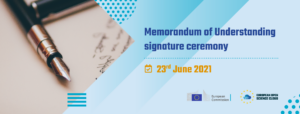European Commission enters into a partnership with the EOSC Association
Brussels, 23rd June 2021.

The European Commission’s annual flagship Research and Innovation event, European Research and Innovation Days, is a key milestone in the implementation of the European Open Science Cloud (EOSC) as the European Commission (EC) and the newly formed EOSC Association sign a Memorandum of Understanding. This marks the start of the Co-programmed European Partnership on EOSC under the Horizon Europe Framework Programme. The EOSC is a key component towards realising the EC’s Open Science policy, providing a European Research Data Commons where data are findable, accessible, interoperable and reusable (FAIR), thus enabling interdisciplinary and impactful science in the digital age.
The Partnership between the newly formed EOSC Association and the European Commission has invited representatives of the Member States and Associated Countries (MS/AC) in its governance. It will ensure until at least the end 2030 a coordinated approach from the European Commission, the MS/AC and the stakeholders in investments and initiatives in the EOSC ecosystem. It will also help ensure directionality and complementary commitments and contributions at all levels.
The Partnership will be signed by Mariya Gabriel, Commissioner of Innovation, Research, Culture, Education & Youth and Thierry Breton, Commissioner of Internal Market, signing on behalf of the European Commission. Mariya Gabriel said:
“The European Open Science Cloud will enable researchers to find, create, share and reuse all forms of digital knowledge – such as publications, data and software – leading to new insights and innovations, higher research productivity and improved reproducibility in science. To successfully support the digital transformation of science, this important Partnership must involve all actors – the research communities, our Universities and research institutions, service providers as well as our Member States.”
The EC supports an Open Science policy that builds trust in a digitally enabled and more open and robust research process not only for scientists, but also for society at large. EOSC provides the enabling infrastructure for this to happen and seeks to transform European Science.
President of the EOSC Association Karel Luyben, Rector Magnificus Emeritus of the Delft University of Technology, signs the MoU on behalf of the EOSC Association. He stated:
“The Partnership that we sign today will pave the way for advancing EOSC as the research foundation of the industry-driven European Data Spaces that focus on various sectors relevant for society. EOSC will start federating and strengthening research disciplines and will foster interdisciplinary research. It will support Research and e-Infrastructures to be more widely used and better connected. Overall, we are working on a cultural and technical transition of the way we do science in Europe and beyond. A more efficient and reproducible science trusted by society, more relevant to societal needs and with increased involvement of the society (e.g. through Citizen Science developments).”
The COVID-19 pandemic has demonstrated the impact that Open Science and interdisciplinary research can have. The rapid and collaborative response of the European Research community in implementing the European COVID-19 Data Platform means that scientists can now share data and analysis. This accelerates coronavirus research and demonstrates how FAIR data can work in practice. It also highlights challenges such as how to make of data coming from different domains interoperable.
The partnership represents a new Governance model for EOSC, placing stakeholders across Europe firmly in the driving seat. It will be an essential ingredient in changing the way research is carried out. Leveraging the EOSC Strategic Research and Innovation Agenda (SRIA), defined by the EOSC Governance, the partnership has a number of key objectives to ensure that standards are defined, and services and tools developed to enable researchers to find, access, reuse and combine results from all areas of research; Open Science practices and skills become the new normal and are rewarded and taught across Europe; and to establish a sustainable and federated infrastructure enabling open sharing of scientific results.
The Partnership represents strong commitment from all sides and from all corners of Europe, as we come together to enable impactful science in the digital age.